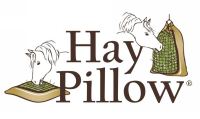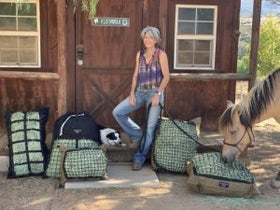6 Reasons to Feed in a Natural Grazing Position:
1) Less Strain on the Skeletal System & Soft Tissue
Less strain on the skeletal system and soft tissue because a horse is designed to eat with the head down.
2) Natural Wear of Teeth & More
A natural grazing position allows the mandible (jaw bone) to come down and forward in the atlantoaxial and temporomandibular joints. This enables the mandible to move up and down, side to side, forward and back without any restriction - facilitating natural wear of teeth along with optimum mastication and reduction of particle size.
3) Better Respiratory Health
Enables nasal passages to drain effectively thereby minimizing the inhalation of dust and particles.
4) Relaxed Mental & Emotional State
A horse’s emotional state is reflected in body position and posture. If we require a horse to eat with their head elevated, we are encouraging an alert and tense mental state.
5) Keeps Hay & Dust Out of Eyes
Eliminates the risk of hay and dust falling into your horse's eyes.
6) Unobstructed Peripheral Vision
The Standard Hay Pillows and Mini Hay Pillows® do not impair the horse's peripheral vision. If impaired, this can create tension psychologically. Horses are prey animals and depend on sight and sound to detect predators.
*Note: Shod livestock should not use any netting device on the ground. Due to the dangers involved in using any mesh material that can potentially get caught on a horseshoe, it is not safe or recommended. We do not recommend the use of netting devices with horned animals or horses with blankets or halters that can potentially become snared in netting.
See our Slow Feed Solutions By Enclosure Type & Weather Conditions to learn more about appropriate choices for shod and barefoot livestock depending your unique environment.
More Helpful Slow Feed Resources
- Study - How Hay Feeder Height Affects Jaw, Neck & Back Posture in Horses
- Free Choice Forage Action Plan
- 6 Great Reasons to Feed Your Horse from Ground Level
- 9 Benefits of Slow Feeding Horses
- 7 Slow Feed Dos and Don'ts for Horses
- 7 Easy Ways to Help Prevent Colic
- Never Exercise Horses on an Empty Stomach...Ever!
- Why Most Horse Prefer to Eat Outside



